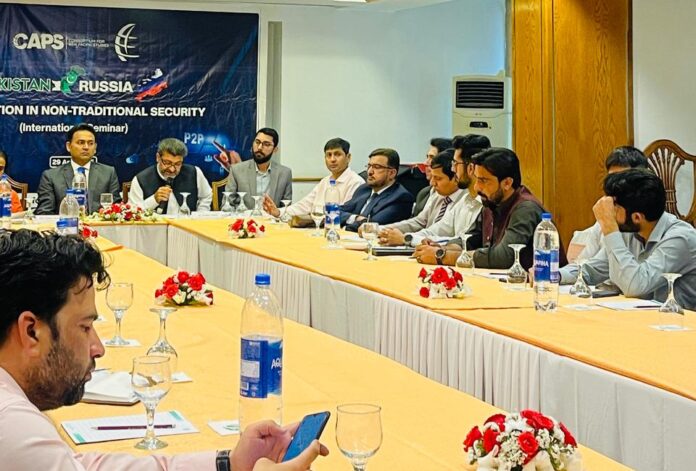- Advertisement -
ISLAMABAD, Apr 29 (APP):Pakistan and Russia are seeking to move beyond conventional diplomacy, focusing on shared concerns like water, migration, technology, and trade. This shift was the key theme at an international seminar organized by the Consortium for Asia-Pacific Studies (CAPS) here on Tuesday.
The seminar, titled “Pakistan-Russia Cooperation in Non-Traditional Security,” brought together academics, researchers, and policy experts from both countries to explore broader forms of collaboration. The session was chaired by Dr. Khuram Iqbal, President of CAPS.
During the seminar, Dr. Roksolana Zigon, a Russian expert on geopolitics, stated that the unilateral suspension of the Indus Water Treaty is unacceptable, criticizing the Indian media for overly exaggerated narratives. She mentioned that Russia can play a significant role in de-escalating tensions between India and Pakistan, as it did in securing the Tashkent agreement decades ago. Discussing non-traditional security, she highlighted how technology sharing could address Pakistan’s water crisis and shared climate change concerns. These efforts, she emphasised, need to be embedded into a strategic narrative.
Dr. Ilsur from Kazan University spoke about the under explored cultural connections between Pakistan and Russia. He outlined three key areas for future cooperation: political ties, trade partnerships, and cultural exchanges. He noted that the foundation of these relations lies in shared cultural and economic interests.
Dr. Shabbir Ahmed, Director of the CARS Area Study Centre at the University of Peshawar, addressed the prospects for labour exports under Russia’s evolving immigration policies. He discussed untapped migration opportunities and the historical shift from traditional to non-traditional partnerships, stating, “We are natural partners.”
Taimur Fahad, Associate Researcher at the Institute of Strategic Studies, Islamabad, delivered an in-depth analysis of the North-South Corridor’s role in enhancing Pakistan-Russia connectivity. He further highlighted the potential opportunities under the International North-South Transport Corridor (INSTC), which is crucial for diversifying trade routes. The practice of barter trade has been immensely beneficial in maintaining smooth trade despite geopolitical changes. He proposed several policy recommendations, including focusing on institutional dialogues, prioritising bilateral relations, and promoting public-private partnerships.
Gleb Makarevich, Senior Research Fellow at the Primakov Center for World Economy and International Affairs, Russian Academy of Sciences, discussed the current state of academic collaborations, identifying bureaucratic barriers and limited awareness as major hurdles. He expressed optimism about progress in academic linkages but also pointed out several persistent problems.
In her closing remarks, Ambassador Naela Chohan appreciated such engaging events and expressed the need for Central Asian regional study centres across the region committed to facilitating dialogue and collaboration to foster comprehensive, long-term cooperation between Pakistan and Russia.
Earlier, Dr. Muhammad Shoaib, Senior Vice President of CAPS, opened the session with remarks highlighting the growing importance of nontraditional security partnerships in a multipolar world.

